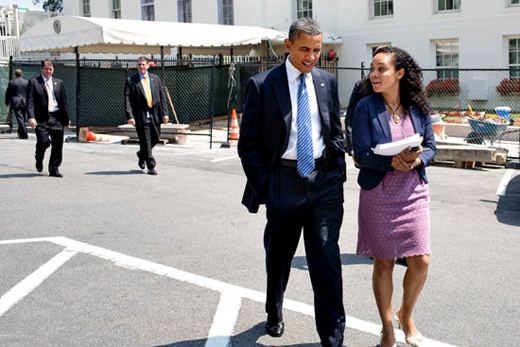Within months of graduating from Emory as a Mellon Mays Undergraduate Fellow with a degree in women's studies and global health—not to mention the Lucius Lamar McMullan Award, one of the university's top student honors—Monique Dorsainvil (2009, College) was working in the White House. In September 2009, she was one of seven interns selected to work with First Lady Michelle Obama. Now serving as director of planning and events for the Office of Public Engagement (OPE) and the Office of Intergovernmental Affairs (IGA), she's been learning her way around the White House ever since.
This summer, Emory Magazine caught up with Dorsainvil for a Q&A.
Tell me a little about your background and childhood. What people or experiences influenced you as a kid?
I grew up in Woodland Hills, California, a suburb of Los Angeles, and was raised in a single-parent household alongside my two younger brothers—one of whom currently attends Emory.
I come from a lineage of spirited women. My grandmother emigrated from Haiti to New York in the 1950s and raised five women on her own. Raised during a time where there was pressure on immigrants to assimilate, my mother and her siblings never learned French or Creole, as they were instructed to solely speak English.
When I was born, my mother decided that would change. She enrolled me in a bilingual French school when I was five years old and worked at the LycéeInternational of Los Angeles (LILA) to offset my tuition. She has worked there for more than twenty years now, teaching ESL and managing campus operations to ensure my brothers and I could benefit from a dynamic education.
When you were young, did you aspire to a career in politics or public service? What did you want to be when you grew up?
I knew from a young age that education was important to me and that whatever I did I wanted to do it well. Throughout my childhood, my mother placed a strong emphasis on hard work and education. As a first-generation Haitian American woman raising a daughter in a single-parent home, my mother taught me a thing or two about tenacity and drive. Growing up in a low-income home, she focused less on what we didn't have and more on how my siblings and I could obtain the skills that would be necessary to realize our dreams. My mother pushed us to work hard and equipped us with the tools and the mentors that helped transform our hard work into concrete opportunities. With no family background in government or politics, working in D.C. was not something that had previously entered my childhood imagination. In addition to working at LILA, my mother worked odd jobs and around the clock to put food on the table, pay the bills, and ensure that my two brothers and I received a strong education. Despite these constraints, my mother made sure that the four of us got up each Thanksgiving to volunteer at our local homeless shelter. Similarly, when I came home from school one day asking to go on the expensive annual ski trip with my class, my mother taught me what it was to launch a fund-raising campaign. It was because of her that I began to understand the power of organizing and to view myself as an individual in a collective community with the agency to change the circumstances that I lived in.

